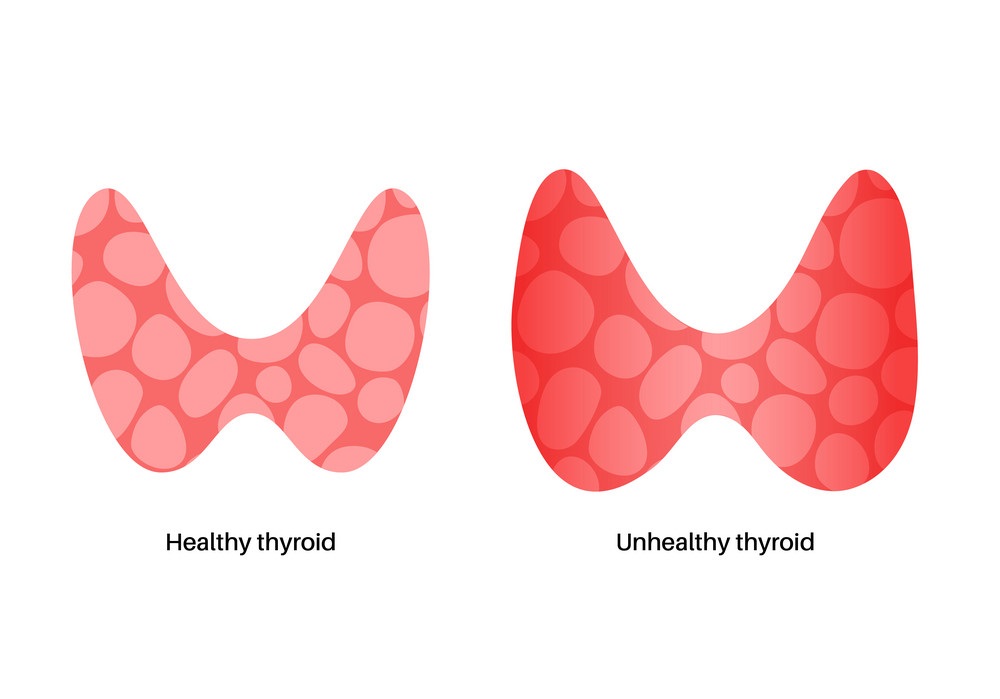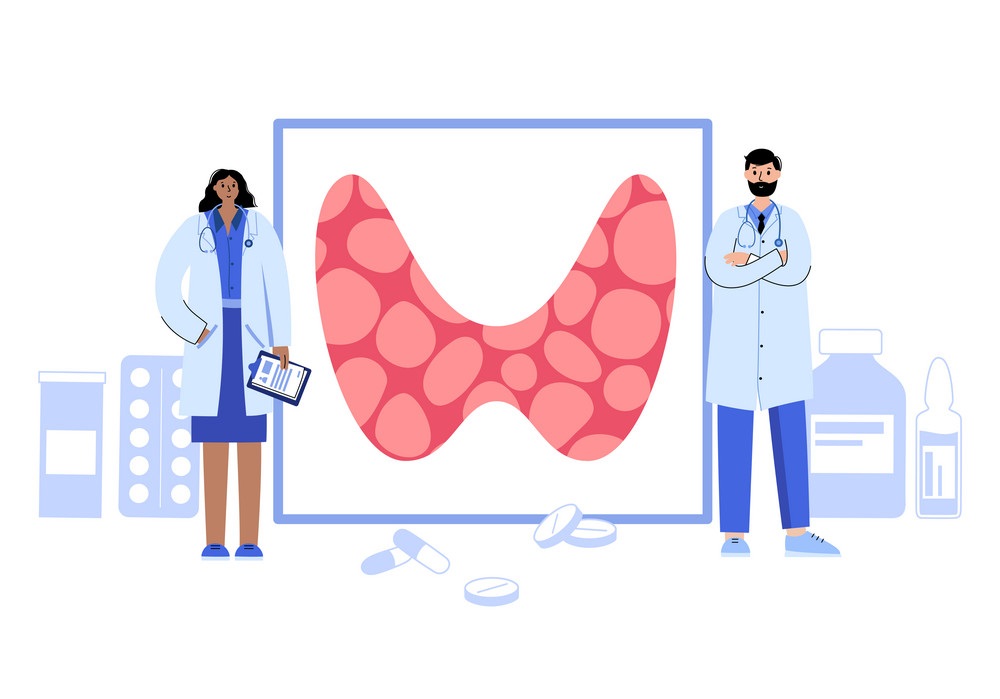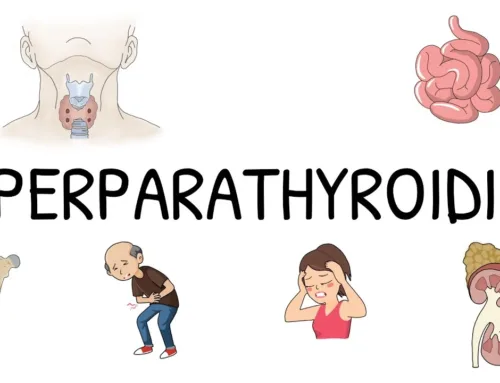Hashimoto’s thyroiditis is difficult to diagnose, especially at the onset of the condition. The diagnosis of Hashimoto’s Thyroiditis is a multi-step process and depends largely on medical history, physical examination, and laboratory results.

Source: VectorStock
It is found by following a blood test review, anti-TPO antibodies lab test, and an ultrasound of the thyroid tissues. Hashimoto’s thyroiditis is not an easy disease to bounce back from, but ready to apply the best treatments by healthcare providers.
It may take some time for the person to take full control. This is because the condition is progressive in nature, which means it can be triggered at any age. The body tends to be affected as a result of another underlying medical condition or genetics.
Hashimoto’s Thyroiditis
Hashimoto’s thyroiditis is a condition in which the thyroid gland becomes inflamed. The thyroid gland is part of your endocrine system, which produces hormones that help control your metabolism and other body functions. Hashimoto’s thyroiditis can cause painless swelling in your neck and cause you to feel tired, have difficulty concentrating, and gain weight.

Source: VectorStock
Hashimoto’s disease or often known as Hashimoto’s thyroiditis, is a rare and chronic inflammatory disease of the thyroid gland. It is an autoimmune disorder which means that the immune system incorrectly attacks healthy tissue. The attack leads to inflammation of the thyroid gland in the time leading to hypothyroidism.
Hashimoto’s thyroiditis is the most common cause of hypothyroidism or underactive thyroid. It’s also known as chronic lymphocytic thyroiditis or chronic autoimmune thyroiditis. According to statistics, 1 in 10 Americans has Hashimoto’s thyroiditis.
Symptoms Of Hashimoto’s Thyroiditis Disease

Source: VeryWell Health
Symptoms vary from person to person. Some people have no symptoms at all; some have symptoms only on occasion; others have symptoms all the time.
The symptoms of Hashimoto’s are similar to those of other types of thyroid disease and may include:
- Fatigue
- Lapses in memory (Brain fog)
- Weakness
- Muscle pain (myalgia)
- Joint pain (arthralgia)
- Goiter
- Weight gain or weight loss
- Depression
- Difficulty concentrating
- Mood swings
- Increased sensitivity to cold
- A puffy face
- Enlargement of the tongue
- Infertility (in women)
- Dry skin
- Brittle nails
- Hair loss or thinning hair.
- Heavy menstrual bleeding (menorrhagia)
- Irregular menstruation (oligomenorrhea)
- Low sex drive
- Growth delay in children
- Constipation
- Diarrhea
Diagnosis Of Hashimoto’s Thyroiditis Disease
Hashimoto’s thyroiditis is more common in women than men and usually occurs in people between the ages of 30 and 50.
Hashimoto’s is usually diagnosed based on your symptoms, physical exam, and blood tests. Your doctor will ask about your medical history, including any family history of autoimmune diseases such as type 1 diabetes or rheumatoid arthritis. During a physical exam, your doctor will check your general health and listen to your heart and lungs for any signs of respiratory problems related to low hormone levels. Your doctor will also measure your pulse rate to determine if you have slowed pulse activity due to low hormone levels.

Source: VectorStock
Hashimoto’s disease is diagnosed based on symptoms and results of blood tests such as:
1. Thyroid Function Test (TFT)
Used to measure levels of thyroid hormones T4 (thyroxine) and TSH (thyroid-stimulating hormone). A normal result indicates that your thyroid gland is working normally. An abnormal result may indicate an underactive or overactive thyroid gland. Your doctor may also order another type of TFT called Free T4, which measures the amount of unbound (free) T4 circulating in your blood rather than the total T4 levels present in your body.
2. Thyroid-Stimulating Hormone (TSH) Test
The TSH stimulation test is a blood test used to diagnose and monitor hyperthyroidism and hypothyroidism. Thyroid-stimulating hormone (TSH), also known as thyrotropin, is a pituitary hormone that stimulates the thyroid to produce thyroid hormones. It is produced by thyrotrophin cells in the anterior pituitary. The TSH test measures levels of thyroid-stimulating hormone, which is produced by your pituitary gland to tell your thyroid gland to make more thyroid hormone (T3). The normal range for TSH is 0.5–4 mIU/L, and your doctor will use these numbers to determine if any treatment is necessary.
3. Blood Test For Antibodies
A blood test is usually the first step in diagnosing Hashimoto’s disease. It measures levels of antibodies directed against the thyroid itself, which means it is an autoimmune disease. A positive result indicates a high likelihood of developing Hashimoto’s disease.

Source: VectorStock
4. Thyroid Peroxidase Antibody Test (TPO-Ab)
Thyroid Peroxidase Antibody (TPO Ab) is an antibody that is produced by the body against its own thyroid cells. This antibody can be found in patients with Hashimoto’s thyroiditis, a condition where the immune system attacks the thyroid gland. It can also be due to other causes such as autoimmune conditions like Grave’s disease or chronic lymphocytic thyroiditis. The TPO antibodies can be detected in the serum of these patients using immunofluorescence methods or radioimmunoassay methods. The normal range of TPO Ab is 0-35 IU/mL.
Immunofluorescence Test
In this method, a patient’s serum sample is incubated with an anti-human TPO antibody and then incubated with fluorescein isothiocyanate-labeled goat anti-mouse IgG antibody. Fluorescein isothiocyanate-labeled human TPO is added to the mixture. If there are TPO antibodies present in the serum sample, they will bind to specific sites on human TPO molecules, causing them to become fluorescent under ultraviolet light.
Radioimmunoassay Test
Modern measurement of thyroid hormones is done by a new technique, radioimmunoassay (RIA), discovered by Dr. Solomon Berson and Dr. Rosalyn Yallow. They were awarded the 1977 Nobel Prize in Medicine for this discovery which revolutionized the study of thyroid disease as well as the entire field of endocrinology. Radioimmunoassay (RIA) is an in vitro assay that measures the presence of an antigen with very high sensitivity. Basically, any biological substance for which a specific antibody exists can be measured, even in minute concentrations. The target antigen is labeled radioactively and bound to its specific antibodies (a limited and known amount of the specific antibody has to be added). A sample, for example, a blood serum, is then added in order to initiate a competitive reaction of the labeled antigens from the preparation, and the unlabeled antigens from the serum sample, with the specific antibodies.
5. Thyroglobulin Antibody (Tg Ab)
The TgAb test can help pinpoint autoimmune thyroid disorders, such as Graves’ disease and Hashimoto’s Thyroiditis. Your doctor may order the test if you have signs or symptoms of a thyroid disorder. Some symptoms of hypo- and hyperthyroidism may overlap. For example, both can cause thyroid gland enlargement and neck swelling. Thyroglobulin antibody (TgAb) tests are usually performed alongside thyroglobulin tests to monitor thyroid cancer patients and check for cancer recurrence after surgery. These two tests are done together because TgAb interferes with thyroglobulin measurements, resulting in falsely low levels. TgAb testing helps doctors determine the extent of interference. However, since this interference varies from person to person, estimating the true thyroglobulin levels can still be challenging.
6. Radioactive Iodine Uptake Test
The radioactive iodine uptake test is a nuclear medicine test that uses radioactive iodine to measure how well the thyroid gland is functioning. The amount of radioactive iodine that is taken up by the thyroid gland is then measured and compared with normal values. This test can be used to diagnose or monitor Hashimoto’s thyroiditis.

Source: VectorStock
7. Thyroid Ultrasound
A thyroid ultrasound scan is a noninvasive procedure used to examine internal organs such as the liver and kidneys without radiation exposure. It uses high-frequency sound waves that travel through body tissues and create pictures of their internal structures on a monitor screen. A technician uses a wand-like probe that emits sound waves from various angles to create images of various internal organs and structures within them; this process is repeated until a complete picture has been obtained for analysis by a physician.
8. Thyroid Biopsy (Fine-Needle Aspiration)
Thyroid biopsy (fine-needle aspiration) is a procedure used to diagnose Hashimoto’s thyroiditis. In this test, a needle is inserted through the skin and into the thyroid gland to remove samples of tissue for examination under a microscope.
To prepare for the procedure, you will be given a local anesthetic to numb the area where the needle will be inserted. This may cause some discomfort but shouldn’t last more than a few seconds. You may also receive antibiotics before the procedure to prevent infection.
9. A Physical Exam
Your doctor will check your neck for lumps or enlarged lymph nodes. He or she also may measure your pulse rate and blood pressure and test your reflexes. These tests help determine whether you have hypothyroidism caused by Hashimoto’s disease or another condition such as chronic lymphocytic thyroiditis (Hashimoto’s disease with another cause) or other forms of autoimmune thyroid diseases such as Graves’ disease.
Conclusion
Hashimoto’s thyroiditis is mostly diagnosed by doctors through physical examination and medical history. Other diagnostic tests can be done to rule out other conditions that can cause a similar presentation. Hashimoto’s thyroiditis is not known to cause symptoms such as joint pain, muscle pain, or pain in the face or jaw.
You may have some ill effects with this disease, but they may not be evident as your thyroid gland is one of the least-used glands in the body. Hashimoto’s thyroiditis may sometimes present with swelling in the front of the neck, and this needs to be looked into by a doctor as soon as possible.

Source: VectorStock
If you are facing any issues that you think may be a symptom of Hashimoto’s Thyroiditis, book an appointment with us at your earliest.




[…] Do you know How is Hashimoto’s thyroiditis is diagnosed? […]
[…] Also read How is Hashimoto’s thyroiditis diagnosed? […]